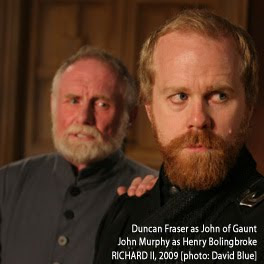Suor Angelica kills herself. Gianni Schicchi pulls a fast one.
People Who should see this show:
Suor Angelica -- no one.
Gianni Schicchi -- everyone.

The tickets had SUOR ANGELICA in huge print, with Gianni Schicchi written underneath. Not the choice I would have made.
We entered the lobby, which was filled, it was nice to see, with a mix of ages. Lots of children and university students, middle-aged and old people. I like that in an opera audience. We found our seats, looked around us and waited.
Then came the speech, delivered by the Head of UBC voice and opera, Nancy Hermiston. God, I am sick of speeches before shows. If I want to know who the sponsors are, I will read the program.
At last, Suor Angelica. A boring story, predictably directed. Hermiston must have put a good deal of thought into how to ensure the cast always ended up in a semi-circle on stage, regardless of the action, entances, exits and narrative. Ruth Greenaway-Robbins was a convincingly distraught Suor Angelica, the only performer who played anything more than a characature. During group scenes, it was charming to see the lead actually acting, but when she played in a duet opposite Charlotte Burrage, the principessa, the juxtaposition of Greenaway-Robbins' shrieking histrionics with Burrage's confused stoicism was unbearably comic; if I had been the principessa, I would have thrown her into a convent too.
I was glad it was a one-act. I was amused to see Hermiston take the final bow.
The nuns sold 50-50 tickets in the intermission. Seriously. Now that is comedy.
Another speech preceded Gianni Schicchi. I ground my teeth a little, but it turned out to be a draw for the 50-50 tickets, and the first genuinely interesting moment of the evening, when the nun who was doing the draw discovered that she had pulled her mother's name.
Gianni Schicchi was brilliant from the first note. First of all, it's a funny story with beautiful music. Second, it was well performed and well directed. It was full of life at every moment, and I was interested to see what would happen next for the whole show. I had never heard of either opera before, but Gianni Schicchi did feature a familiar aria: "O Mio Babbino Caro," which was beautifully performed by Teresa Sedlmair.
Hermiston took a bow again, but this time I stopped clapping. Enough was enough.
Some Highlights:
Cameron McPhail's Gianni Schicchi: well acted and sung.
Teresa Sedlemair's Lauretta: brilliant aria.
Hany Janawati's Zita: I laughed every time I saw the scowl on her face. Good voice, too.
Martin Sadd'd Rinuccio: difficult to play a serious character well when you're surrounded by comedy, but he pulled it off admirably.
Stephanie Ferracane's La Ciesca: brilliant comic timing.




